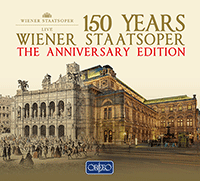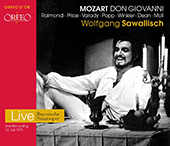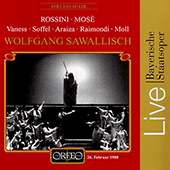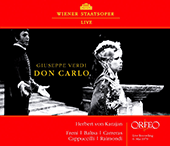Ruggero Raimondi
The distinguished bass-baritone Ruggero Raimondi auditioned when only fifteen years old for the conductor Francesco Molinari-Pradelli, who encouraged him to pursue a career in opera. He therefore commenced vocal studies with Ettore Campogalliani and enrolled at the Giuseppe Verdi Conservatory in Milan, later continuing his studies in Rome at the Accademia di Santa Cecilia where he was a pupil of Teresa Pediconi and Armando Piervenanzi. Raimondi went on to win the Adriano Belli Singing Competition and made his opera debut at the Spoleto Sperimentale (a programme for young singers) as Colline in La bohème in 1964. This debut was followed shortly afterwards by his appearance in the leading role of Procida in Verdi’s I vespri siciliani at the Rome Opera House, where he had been understudying Nicola Rossi-Lemeni in this part.
The manager of the La Fenice Opera House in Venice, Mario Labroca, hearing of this performance, invited Raimondi to audition and offered him a five-year contract to appear at La Fenice. At this time an extremely shy person and consequently very stiff on stage, Raimondi worked in Venice with vocal coach Leone Magiera, who taught him interpretation, and took acting lessons from Piero Faggioni, who taught him how to coordinate vocal production and physical motion. The combined work of these two distinguished teachers gave Raimondi the skills that he needed to become a singing actor of stature.
At La Scala, Milan Raimondi first appeared in 1968 as Timur in Puccini’s Turandot, a debut swiftly followed by others at most of the world’s leading opera houses. These began at the Glyndebourne Festival in 1969, where he sang what was to become his ‘signature’ role, Mozart’s Don Giovanni. (He directed his own production of this opera for the first time in 1986.) The following year he made his debut at the Metropolitan Opera, New York as Silva in Verdi’s Ernani; in 1972 he appeared at the Royal Opera House as Fiesco in Tito Gobbi’s production of Verdi’s Simon Boccanegra; and returned to the role of Procida for his debut at the Paris Opera in 1975.
Raimondi’s now commanding presence on stage had not gone unnoticed by film-makers and in 1978 the director Joseph Losey cast him once again in the title role of Don Giovanni for a film of this opera which was released to international acclaim. Later film successes included Francesco Rosi’s production of Bizet’s Carmen in 1984, in which he played Escamillo, and Benoît Jacquot’s production of Tosca in 2001, which preserved Raimondi’s interpretation of the notorious Baron Scarpia.
Back in the opera house, Raimondi’s career continued to flourish: he made his debut at the Salzburg Festival in 1980 as the King in Verdi’s Aida with Herbert von Karajan conducting. Throughout the 1980s and 1990s he was active in Italy and Germany, appearing for instance at the Verona Festival and the Rossini Festival at Pesaro as well as at the opera houses of Bologna, Florence, Berlin, Munich and Hamburg. He continued to extend his repertoire, singing the four villains in Offenbach’s Les Contes d’Hoffmann at Zürich in 1995, Iago in Verdi’s Otello at the Salzburg Festival in 1996 and the title role in Verdi’s Falstaff at Berlin in 1998.
Among Raimondi’s many other operatic roles are King Philip in Verdi’s Don Carlo, Silva, Count Almaviva in Le nozze di Figaro, Don Alfonso in Così fan tutte and the title roles in Massenet’s Don Quichotte and Mussorgsky’s Boris Godunov.
In 2008 Raimondi appeared as an actor in the French television series Le Sanglot des anges in which he played the role of an Italian opera singer; and in July 2011 sang Pagano in Verdi’s I Lombardi alla prima crociata in a concert staged on the rooftop of Milan Cathedral to celebrate the 150th anniversary of Italian unity.
© Naxos Rights International Ltd. — David Patmore (A–Z of Singers, Naxos 8.558097-100).




















